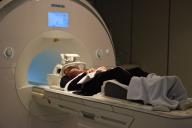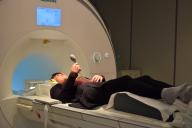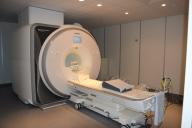






address: our fMRT-studies are executed at the TRIC location
Translational Research Imaging Center (TRIC)
- in the past: Haus Rosenbach -
Albert-Schweitzer-Campus 1, Gebäude A16
(Waldeyer Straße 1) 48149 Münster
Magnetic Resonance Tomography (also known as nuclear spin tomography) makes use of a strong magnetic field and radio waves to generate arbitrarily oriented sectional images of the human anatomy.
The greatest benefit of MR tomography is its underlying, completely non-invasive procedure which does not involve any form of ionizing radiation exposure. Furthermore, an accurate volume acquisition of the human brain (resolution of approx. 1 mm3) with an excellent contrast between gray and white matter can be acquired within several minutes. Ultrafast sequences even enable the detection of dynamic changes in neural metabolism during image acquisition (fMRI). fMRI relies on contrast mechanisms, such as the BOLD signal (small changes in the magnetic properties due to the cerebral blood flow in active brain tissue), to map neuronal responses to particular tasks and activities.
If you do not feel comfortable or want to stop the experiment while you are undergoing an MRI scan, you can do so at any time without stating a reason. An intercom allows you to be in touch and communicate with the experimenter or with the medical technical assistant.
Potential hazards generally associated with the operation of MRI include exposure to static and time-varying magnetic fields, high-frequency electromagnetic fields, and the noise caused by the gradient coil. Risks can be avoided by giving careful consideration to the usual security measures (no magnetic objects within the MR proximity, earplugs and headphones to cancel out noise, no skin-to-skin contact or skin-to-scanner wall contact).
More than 450 million human MRI studies have been performed worldwide. According to a study by the OECD, 1000 residents in Germany alone have 131 MRI examinations per year. Apart from a few mishaps involving ferromagnetic objects, no acute or chronic damage to humans has been reported in the last 25 years of MR examinations (without contrast agents). Hence, by taking the usual precautions, accidents are extremely unlikely.
In addition, we would like to draw your attention to the fact that only approx. 3% of all healthy people deviate from the anatomical norm. In rare cases, however, abnormalities requiring treatment can be detected. If there are indications of pathological changes in an examined brain area, we would refer your anonymous brain scans to a specialist. If the abnormality is in need of treatment, we would recommend further diagnostic clarification. Please note that the analysis of the experimental data is not carried out by a clinical specialist and that the applied analytic evaluation does not necessarily target the identification of neural abnormalities. Please also note that the identification of an abnormality requiring treatment may influence your insurance policy (such as a life insurance policy or a private health insurance).
During the experimental procedure you lie calmly and comfortably on the examination table of the MRI. Using a mirror system, you can see a monitor displaying the experimental task in the back of the MRI device and a keyboard is provided to submit your answers. MRI dependent experiments usually take between 45 and 70 minutes, meaning, in addition to the pre-MRI preparations, the total time required to conduct the experiment would be between 60 and 120 minutes.
Individuals who cannot participate in MRI studies are?